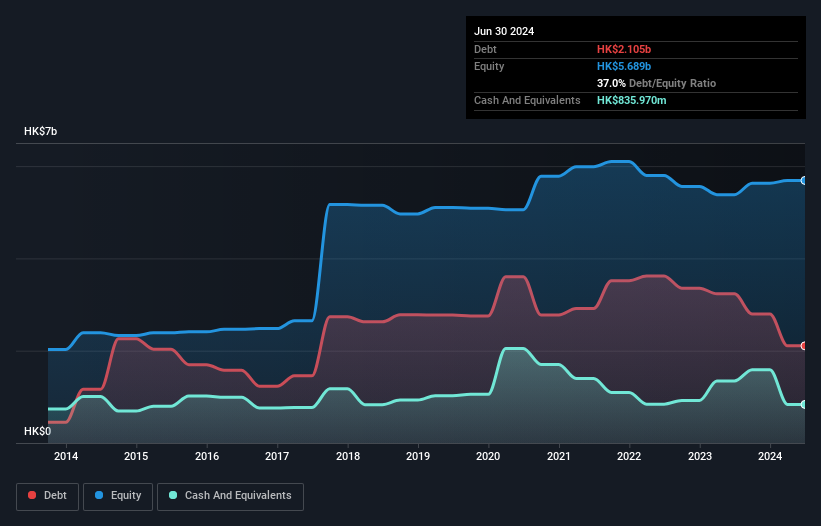Goodbaby International Holdings (HKG:1086) Has A Somewhat Strained Balance Sheet

Warren Buffett famously said, 'Volatility is far from synonymous with risk.' So it might be obvious that you need to consider debt, when you think about how risky any given stock is, because too much debt can sink a company. As with many other companies Goodbaby International Holdings Limited (HKG:1086) makes use of debt. But is this debt a concern to shareholders?
When Is Debt Dangerous?
Generally speaking, debt only becomes a real problem when a company can't easily pay it off, either by raising capital or with its own cash flow. Part and parcel of capitalism is the process of 'creative destruction' where failed businesses are mercilessly liquidated by their bankers. While that is not too common, we often do see indebted companies permanently diluting shareholders because lenders force them to raise capital at a distressed price. By replacing dilution, though, debt can be an extremely good tool for businesses that need capital to invest in growth at high rates of return. When we think about a company's use of debt, we first look at cash and debt together.
View our latest analysis for Goodbaby International Holdings
What Is Goodbaby International Holdings's Debt?
You can click the graphic below for the historical numbers, but it shows that Goodbaby International Holdings had HK$2.11b of debt in June 2024, down from HK$3.23b, one year before. However, it does have HK$836.0m in cash offsetting this, leading to net debt of about HK$1.27b.

How Healthy Is Goodbaby International Holdings' Balance Sheet?
We can see from the most recent balance sheet that Goodbaby International Holdings had liabilities of HK$4.57b falling due within a year, and liabilities of HK$399.6m due beyond that. Offsetting these obligations, it had cash of HK$836.0m as well as receivables valued at HK$1.24b due within 12 months. So its liabilities outweigh the sum of its cash and (near-term) receivables by HK$2.89b.
This deficit casts a shadow over the HK$1.10b company, like a colossus towering over mere mortals. So we definitely think shareholders need to watch this one closely. At the end of the day, Goodbaby International Holdings would probably need a major re-capitalization if its creditors were to demand repayment.
We measure a company's debt load relative to its earnings power by looking at its net debt divided by its earnings before interest, tax, depreciation, and amortization (EBITDA) and by calculating how easily its earnings before interest and tax (EBIT) cover its interest expense (interest cover). The advantage of this approach is that we take into account both the absolute quantum of debt (with net debt to EBITDA) and the actual interest expenses associated with that debt (with its interest cover ratio).
Goodbaby International Holdings's net debt is sitting at a very reasonable 1.6 times its EBITDA, while its EBIT covered its interest expense just 3.0 times last year. While that doesn't worry us too much, it does suggest the interest payments are somewhat of a burden. Pleasingly, Goodbaby International Holdings is growing its EBIT faster than former Australian PM Bob Hawke downs a yard glass, boasting a 3,277% gain in the last twelve months. There's no doubt that we learn most about debt from the balance sheet. But it is future earnings, more than anything, that will determine Goodbaby International Holdings's ability to maintain a healthy balance sheet going forward. So if you're focused on the future you can check out this free report showing analyst profit forecasts.
Finally, while the tax-man may adore accounting profits, lenders only accept cold hard cash. So the logical step is to look at the proportion of that EBIT that is matched by actual free cash flow. Happily for any shareholders, Goodbaby International Holdings actually produced more free cash flow than EBIT over the last two years. That sort of strong cash conversion gets us as excited as the crowd when the beat drops at a Daft Punk concert.
Our View
While Goodbaby International Holdings's level of total liabilities has us nervous. For example, its conversion of EBIT to free cash flow and EBIT growth rate give us some confidence in its ability to manage its debt. Looking at all the angles mentioned above, it does seem to us that Goodbaby International Holdings is a somewhat risky investment as a result of its debt. Not all risk is bad, as it can boost share price returns if it pays off, but this debt risk is worth keeping in mind. When analysing debt levels, the balance sheet is the obvious place to start. But ultimately, every company can contain risks that exist outside of the balance sheet. For instance, we've identified 2 warning signs for Goodbaby International Holdings (1 can't be ignored) you should be aware of.
Of course, if you're the type of investor who prefers buying stocks without the burden of debt, then don't hesitate to discover our exclusive list of net cash growth stocks, today.
New: Manage All Your Stock Portfolios in One Place
We've created the ultimate portfolio companion for stock investors, and it's free.
• Connect an unlimited number of Portfolios and see your total in one currency
• Be alerted to new Warning Signs or Risks via email or mobile
• Track the Fair Value of your stocks
Have feedback on this article? Concerned about the content? Get in touch with us directly. Alternatively, email editorial-team (at) simplywallst.com.
This article by Simply Wall St is general in nature. We provide commentary based on historical data and analyst forecasts only using an unbiased methodology and our articles are not intended to be financial advice. It does not constitute a recommendation to buy or sell any stock, and does not take account of your objectives, or your financial situation. We aim to bring you long-term focused analysis driven by fundamental data. Note that our analysis may not factor in the latest price-sensitive company announcements or qualitative material. Simply Wall St has no position in any stocks mentioned.
About SEHK:1086
Goodbaby International Holdings
An investment holding company, researches and develops, designs, manufactures, markets, and sells durable juvenile products in Europe, North America, Mainland China, and internationally.
Undervalued with excellent balance sheet.
Similar Companies
Market Insights
Community Narratives




